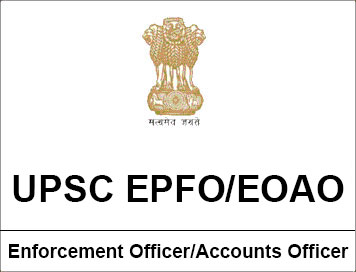
(Result) UPSC Recruitment of 257 Enforcement Officer/
Accounts Officer at EPFO - "Advertisement. No. 53/2016"
UNION PUBLIC SERVICE COMMISSION ADVERTISED 257 POSTS OF ENFORCEMENT OFFICER/
ACCOUNTS OFFICER IN EMPLOYEES PROVIDENT FUND ORGANIZATION, MINISTRY OF LABOUR
AND EMPLOYMENT VIDE SPECIAL ADVERTISEMENT. NO. 53/2016, VACANCY NO. 16065301704
PUBLISHED ON 04.06.2016. THE COMMISSION HAD CONDUCTED A RECRUITMENT TEST ON
26.02.2017. ON THE BASIS OF THE RECRUITMENT TEST, THE COMMISSION HAS SHORTLISTED
CANDIDATES BEARING THE FOLLOWING ROLL NOS. “PROVISIONALLY”. ONLY SUCH CANDIDATES
WHO SATISFY/FULFIL ALL THE ELIGIBILITY CONDITIONS SHALL BE CALLED FOR INTERIVEW
257 POSTS OF ENFORCEMENT OFFICER/ ACCOUNTS OFFICER IN EMPLOYEES PROVIDENT
FUND ORGANIZATION, MINISTRY OF LABOUR AND EMPLOYMENT